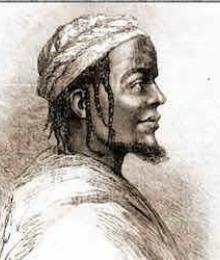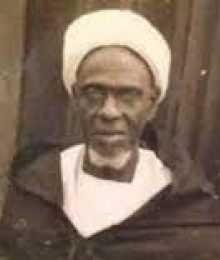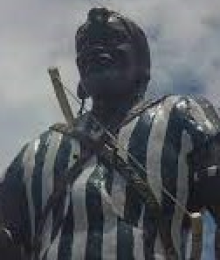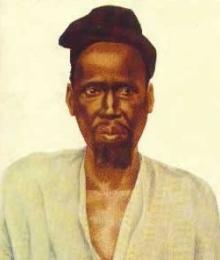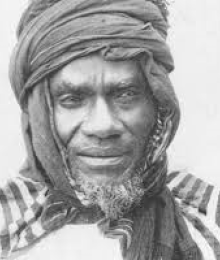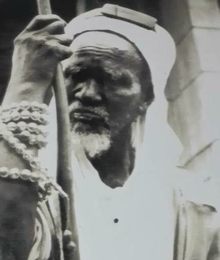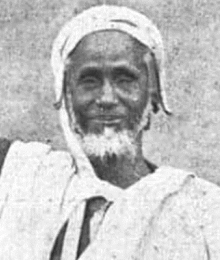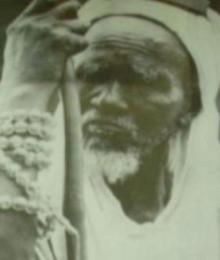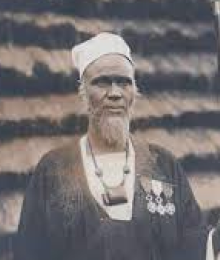
Almamy Bokar Biro Barry (died November 18, 1896) was the last independent ruler of Fouta-Djalon, in present-day Guinea. A member of the Soriya faction, he rose to power in 1890 at the age of 38 after assassinating his elder brother. His reign was marked by significant political instability and fierce resistance against French colonization. Described as a well-built man with an imposing face, he was renowned for his bravery in battle.
Despite internal divisions and colonial pressures, he stubbornly refused to surrender the sovereignty of Fouta-Djalon to the French, even writing "Bismillah" instead of his signature on a protectorate treaty. He died as a hero of African resistance following the Battle of Porédaka, where his army was defeated by French artillery. Pursued to Botorë, he was killed on November 13, 1896, and his death marked the end of Fouta-Djalon's independence, leading to its incorporation as a French protectorate.
Introduction
Bokar Biro Barry, also known as Boubacar Biro, was the last independent ruler of the Imamate of Fouta-Djalon, in what is now the Republic of Guinea. His tumultuous reign and heroic death marked the end of an era of independence for this region of West Africa.
Historical and Political Context
The Imamate of Fouta-Djalon was a theocratic state founded in 1725 by Karamokho Alfa following a jihad and later consolidated by his successor, Ibrahim Sori. This federation of nine provinces operated under a unique power-sharing system between two political factions: the Alfaya and the Soriya, descendants of the first two leaders. The title of Almamy (head of state) alternated between candidates from these two factions.
By the late 19th century, Fouta-Djalon found itself at the center of colonial ambitions. The French, who had become the dominant power in the region, grew increasingly impatient with the state's hostility, particularly due to its support for the Wassoulou Empire of Samory Touré, another significant resistor to French colonization. In 1889, the British officially recognized Fouta-Djalon as part of the French sphere of influence, although they continued to provide subsidies to the state until 1895.
Rise to Power
Born around 1852, Bokar Biro belonged to the Soriya faction and was based in Timbo, the federation's capital. His rise to power was marked by violence: after the death of Almamy Ibrahima Sori Dongolfella in 1890, the council of elders chose Bokar Biro's elder brother as the new sovereign. However, Bokar Biro, then 38 years old, seized power through a coup, assassinating his own brother, Alpha Mamadou Pathé.
Accounts from the time depict Bokar Biro as a well-built man whose face took on a formidable expression when enraged. He had earned a reputation for bravery in battles alongside his father, Almamy Oumar.
An Unstable Reign
Bokar Biro's reign was marked by constant political instability. He faced several significant challenges: conflicts between the Alfaya and Soriya factions, attempts by the provinces of Labé, Timbi, and Fougoumba to gain autonomy, and the exodus of slaves and free people seeking the comparatively less oppressive territories under French control.
In July 1892, he was temporarily forced to cede power to Amadou of the Alfaya faction, only to reclaim it in June 1894. His authoritarian policies led some chiefs to seek French support to overthrow him. On December 13, 1895, he suffered a defeat at Bantignel against disgruntled leaders led by Modi Abdoullaye Dhokhiré but managed to escape. After weeks of disappearance, he reemerged in Kébou and, with the support of the Timbi province, returned to Timbo. Gathering an army of 1,500 men, he defeated his enemies on February 2, 1896.
Resistance to French Colonization
Bokar Biro's relationship with the French was marked by deep mistrust and active resistance. In late 1894, the French sent Raoul de Beeckman as a representative to negotiate a treaty. Tensions escalated following an incident in which a French administrator attacked the village of Nanso without authorization.
Bokar Biro accused the French of several hostile actions, including suppressing the slave trade with Sudan and refusing to return fugitive slaves. He was particularly wary of visits by French agents under the pretense of conducting topographic studies, suspecting them of preparing for military intervention.
In March 1896, during a new attempt at negotiation, Bokar Biro subtly resisted: forced to sign a treaty with the French, he wrote “Bismillah” (in the name of God) instead of his signature, thus invalidating the document. This act demonstrated his determination to preserve the independence of Fouta-Djalon.
The Final Days
After the temporary withdrawal of French troops, Bokar Biro adopted an openly anti-French policy. Refusing to step down at the end of his mandate in April 1896, he pushed the country toward a near-civil war. The French then decided to intervene militarily, planning to divide Fouta-Djalon into smaller client states.
The final battle took place on November 13, 1896, in the plain of Porédaka. Despite his bravery, Bokar Biro's army was decimated by French artillery. After the defeat, he attempted to reach Sokotoro, but exhausted and starving, he arrived in Botorë after three days of barefoot trekking.
A Heroic Death
The precise circumstances of his death, preserved in the oral traditions of Botorë, reveal his final moments. Hiding near the Silikarë stream, he was discovered by his pursuers. According to testimonies, he maintained his dignity until the end: after performing ablutions and praying, he handed his talismans to a warrior of Samory Touré, predicting that Fouta would fall under colonial taxation. He was ultimately killed by the warrior Sita Bendougou on November 18, 1896.
The people of Botorë initially opposed the decapitation of his body, but the warriors exhumed him after burial and took his head to Commander Beckman in Timbo. His grave, measuring about 5 meters, still exists in Botorë and is revered by the local population.
Legacy
Bokar Biro's death marked the end of Fouta-Djalon's independence. The French established their protectorate, and in June 1897, Ernest Noirot became the administrator, launching a campaign to eliminate slavery. In 1904, the French dismantled the power of traditional chiefs, and in 1905, they arrested Alpha Yaya, Bokar Biro's rival, exiling him until his death in 1912.
Today, Bokar Biro is regarded as one of the great figures of resistance to French colonial penetration in Guinea, alongside Samory Touré. His reign, though controversial, illustrates the complexity of Fouta-Djalon's final years of independence, caught between internal strife and colonial resistance. His tomb in Botorë remains a significant site of memory, where local communities continue to honor his legacy through rituals and prayers.











